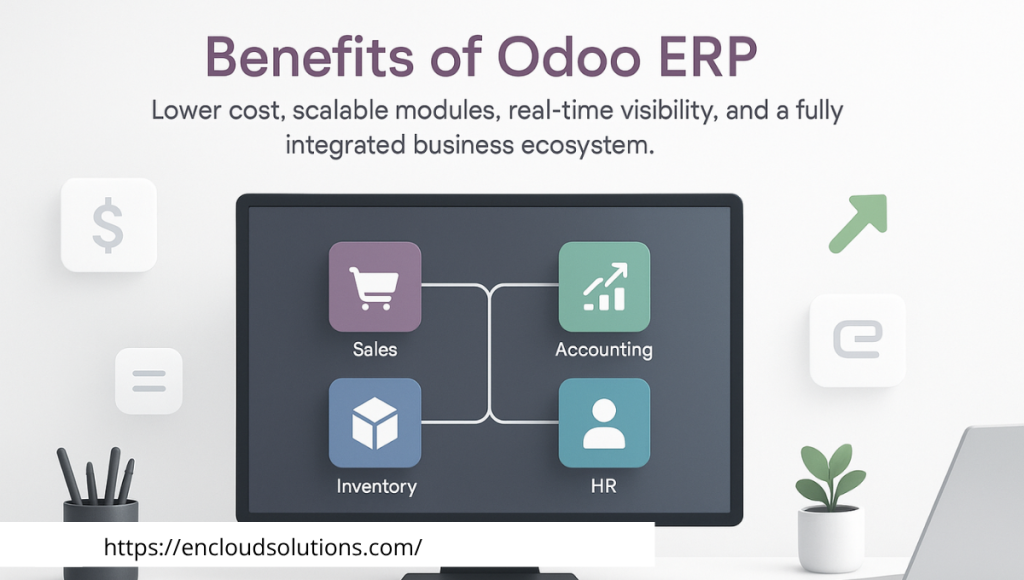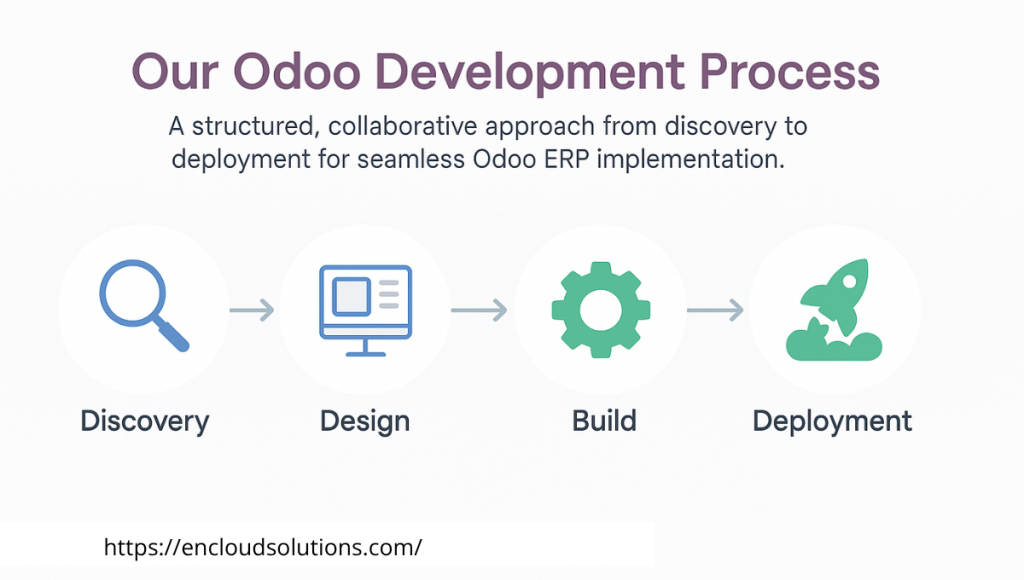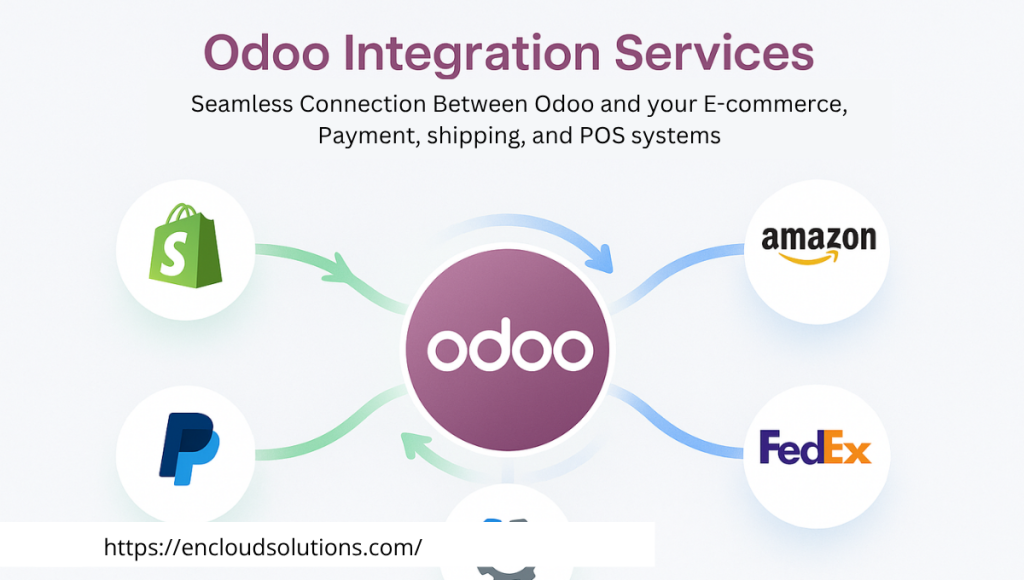
Odoo ERP is an all in one business platform that integrates sales, accounting, inventory, HR, and more into a single system. Its modular design and open-source nature let businesses start small and expand as needed. Odoo’s suite of applications covers core processes (CRM, sales, inventory, manufacturing, accounting, etc.), all tied together by one database. This unified approach reduces data silos and gives you real-time visibility across your organization.
Importantly, Odoo originally stood for On Demand Open Object, reflecting its origins as a flexible, SaaS-friendly ERP. Today, Odoo’s comprehensive features and low cost have made it a top choice for growing companies worldwide.
Also Read: Odoo ERP Tutorial for Beginners
What Is Odoo ERP? (Meaning & Overview)
Odoo ERP software is an integrated suite of business applications that covers CRM, accounting, manufacturing, inventory, HR, and more. In other words, it provides a single, unified system for managing all key operations. This means when you enter sales data or update inventory, every module in Odoo reflects those changes instantly, which gives you an accurate, real-time view of your business. Because it’s modular, you only pay for the apps you use and can add new ones later.
The platform’s name hints at its origins: Odoo stands for “On-Demand Open Object”. In practice, Odoo’s all-in-one design simplifies workflows by breaking down data silos. Companies in 120+ countries (over 7 million users globally) rely on Odoo’s flexibility and affordability.
Benefits of Odoo ERP
If you implement Odoo ERP in your business, it delivers many advantages for your success:
1) Lower Total Cost
As an open-source system, Odoo has minimal licensing fees. Independent studies show Odoo’s five-year total cost of ownership (TCO) can be 40–60% lower than competing systems like SAP or Dynamics. You get enterprise-level features without enterprise-level cost.
2) Modular & Scalable
Only deploy the modules you need now (CRM, sales, accounting, etc.) and easily add more as you grow. This pay-as-you-go model makes Odoo ideal for small and mid-size companies planning to expand.
3) Real-Time Visibility
Odoo’s built-in dashboards and BI tools let you monitor KPIs across departments. For example, its real-time reporting engine has helped companies close their books 25% faster. You get interactive dashboards (sales funnels, financial reports, inventory levels, etc.) in one place, enabling faster, data-driven decisions.
4) Easy-to-Use Interface
Odoo’s modern, web-based UI is intuitive. Users benefit from drag-and-drop dashboard builders and guided setup wizards. Even non-technical staff can navigate Odoo quickly, reducing training time.
5) Integrated Ecosystem
Since all data lives in one database, processes become seamless. Create a sales order and the inventory and accounting entries update automatically. There’s no need for duplicate data entry between separate apps. This unified environment improves accuracy and team collaboration.
6) Customization & Support
Odoo’s open framework (written in Python) means you can tailor the system exactly to your workflows. Plus, a large community and partner network (2,200+ firms) ensures you have local expertise and support.

Key Odoo Modules (Core Functions)
To see how Odoo helps across your business, consider its main apps:
| Odoo App | Function | Business Benefit |
| CRM | Capture leads, opportunities, and customer interactions | Improves sales pipeline management and forecasting. All customer data is centralized for better service. |
| Sales | Manage quotes, orders, and invoicing | Streamlines order-to-cash. Sales orders automatically update inventory and trigger invoices. |
| Inventory | Track stock levels, warehouses, and shipments | Optimizes stock control. Features like barcode scanning and multiple valuation methods reduce shortages. |
| Accounting | Automate invoices, billing, and financial reports | Delivers accurate financial data in real time. Includes bank reconciliation and tax automation. |
| Manufacturing | Handle production, BOMs, and MRP | Improves production planning and shop floor control. Connects sales forecasts to material requirements. |
| HR & Payroll | Manage employees, leave, and payroll | Centralizes employee data and automates payroll, reducing manual HR work and errors. |
Odoo ERP Software Development Services
We specialize in Odoo ERP software development that tailors the ERP to your needs. Whether you need new modules, interface tweaks, or specialized reports, our development team has you covered. We start by understanding your business workflows, then create or customize Odoo modules in Python to automate them.
Our Odoo ERP customization services include everything from designing custom dashboards to integrating specialized hardware (barcode scanners, IoT devices) with Odoo. For example, we can build a custom Odoo app to automate an industry-specific process or extend an existing module with new fields and logic.
Also Read: Zoho Field Service Software That Integrates with QuickBooks
1) Custom Module Development
We write Python code for new Odoo modules. This could be an advanced inventory rule, a unique manufacturing workflow, or a custom sales commission calculator.
2) End-to-End Implementation
Beyond coding, we handle the full rollout. Our process includes business analysis, system design, configuration, and thorough testing before going live. We ensure minimal disruption so your team adopts Odoo smoothly.
3) UI & Dashboard Customization
We tailor the Odoo interface and dashboards for your users. Using Odoo Studio or direct code changes, we add new forms, fields, buttons, and charts. Your team sees the key information (KPIs, charts) right on their home screen.
4) Odoo ERP Customization Services
Standard Odoo modules may not fit exactly how you work, so we customize them. For instance, we might adjust the sales app to handle unique discount rules or expand the inventory app for multiple warehouses and zones. Every customization is built with scalability in mind.
5) Data Migration
Moving your existing data (from spreadsheets, legacy ERP, etc.) into Odoo is handled securely. We map and transfer accounts, customers, products, historical transactions, and more with high accuracy, so nothing important gets lost in transition.
6) Ongoing Support & Training
After deployment, we keep your Odoo system running flawlessly. We offer training for your staff, periodic tune-ups, version upgrades, and a helpdesk for any questions. Our goal is that you maximize ROI from day one.
Our Odoo Development Process
1) Discovery & Planning
We start with workshops to understand your processes, data flows, and goals. This establishes clear project scope and timelines.
2) Design & Prototype
We configure a sample Odoo environment (proof of concept) with your core processes. You see early results and suggest adjustments.
3) Custom Build & Test
Based on approved requirements, our developers build and customize modules. We perform unit and system testing to ensure everything works as intended.
4) Training & Deployment
We train your team on the new system and rollout Odoo to production. Post-launch, we monitor performance closely, fix any issues, and adjust as needed.
Every step is collaborative; we involve you at key milestones for feedback. This structured approach minimizes risk and ensures the finished Odoo solution matches your unique needs.

Odoo Integration Services
Seamless data flow is vital. Our Odoo integration services connect Odoo with your other software so information moves automatically between systems. For example, we can link Odoo to e-commerce platforms, payment gateways, shipping carriers, or legacy systems. Typical integrations include:
1) E-commerce Connectors
Sync products and orders with Shopify, WooCommerce, Amazon, or Magento. New online sales appear in Odoo automatically, triggering stock updates and invoices.
2) CRM & Marketing Tools
Tie Odoo to email marketing or CRM systems (if you use tools outside Odoo). This ensures your customer data and leads are unified.
3) Payment & Shipping
Integrate payment processors (Stripe, PayPal) and carriers (UPS, FedEx) so transactions and tracking info flow into Odoo without manual entry.
4) Point-of-Sale (POS)
Connect retail or restaurant POS terminals with Odoo Inventory and Accounting. Sales at the register instantly update Odoo’s books and stock.
5) Custom API Connections
We build custom middleware or use Odoo’s REST/XMLRPC APIs for any other tool you use. For instance, a warehouse system or external manufacturing software can sync with Odoo.
These integrations eliminate double data entry and ensure everyone sees the same numbers. As Encloud notes, our Odoo Integration Services include real-time API connectors for Shopify, WooCommerce, Amazon, POS terminals, and other systems. The result is a unified ERP ecosystem where your sales, inventory, accounting, and other apps talk to each other effortlessly.

Odoo Dashboard & Reporting
Odoo’s built-in dashboard functionality puts critical business metrics at your fingertips. After implementation, you’ll have live dashboards showing things like sales pipeline, inventory levels, cash flow, and project statuses. These dashboards are fully customizable with drag-and-drop charts and KPI cards. For example, you can configure an Odoo dashboard to display monthly revenue vs. target, top-selling products, or overdue invoices. Because Odoo’s data is unified, these dashboards automatically aggregate information from every module.
No more juggling multiple reports; one click in Odoo gives you a company-wide snapshot. This real-time insight helps you make faster decisions; studies show Odoo’s real-time BI capabilities can accelerate reporting by up to 35%. We can build custom reports or dashboards tailored to your industry, ensuring you track exactly what matters to your organization.
Also Read: Odoo ERP Advantages and Disadvantages
Why Work with Our Odoo Consultants?
Choosing the right ERP partner is crucial. At Encloud Solutions, our Odoo consultants are seasoned experts in both technology and business. We are a certified Odoo partner with over 100 global deployments and a 98% customer satisfaction rate. Our team doesn’t just know Odoo’s modules — we understand how to apply them in real businesses. We’ll guide you through strategy, configuration, training, and support. Whether you need help choosing between Odoo’s Community or Enterprise editions, selecting the right modules, or planning your roll-out, our consultants handle every detail. And after launch, we continue to monitor your system and recommend optimizations.
When you work with us, you get more than just implementation – you get a long-term ERP advisor. Contact our team, and one of our Odoo consultants will listen to your challenges and craft a plan to transform your operations. Our proven approach and client-focused service ensure your Odoo project delivers real ROI.
Ready to optimize your operations with a tailored Odoo ERP solution? Contact us today to connect with our Odoo consultant and see how custom Odoo development, integration, and support can take your business to the next level.
Frequently Asked Questions
What is Odoo ERP development?
Odoo ERP development refers to the process of building, customizing, and configuring the Odoo software to meet your business needs. This includes creating custom modules in Python, tailoring workflows, setting up dashboards, and migrating your existing data into Odoo. In short, it’s how we adapt the Odoo ERP platform to automate and optimize your specific processes.
Which programming language is used in Odoo?
Odoo is primarily built in Python. All new backend modules and business logic are written in Python. Odoo also uses XML for defining views and data structures, and JavaScript for dynamic user interface elements. Developers typically use Python (and SQL for the PostgreSQL database) when developing or customizing Odoo.
Is an Odoo developer a software developer?
Yes, an Odoo developer is essentially a software developer who specializes in the Odoo ERP framework. They write code, configure applications, and solve technical problems within Odoo. According to industry sources, an Odoo developer “specializes in creating, customizing, managing, implementing, and improving the products” in the Odoo suite. In other words, they are programmers with specific expertise in Odoo’s technologies and best practices.
Is Odoo development easy?
Ease of development can depend on your background. Odoo is written in Python and is known for being relatively straightforward for Python developers. Many resources and tutorials are available, and Odoo’s modular architecture makes customization logical once you learn the framework. Odoo is often considered “one of the easiest ERP software” to learn and use for businesses. However, like any powerful ERP, there is a learning curve. With our experienced team helping, your development journey will be much smoother.


